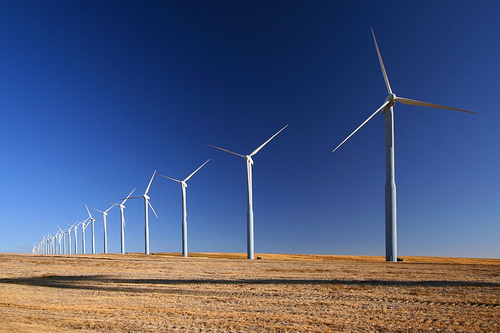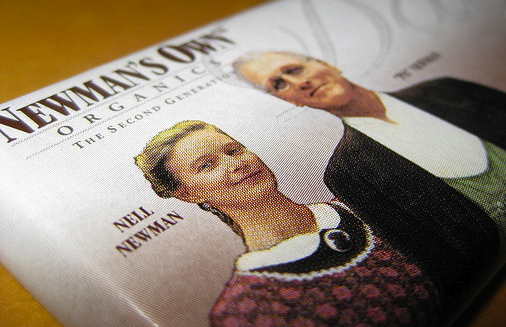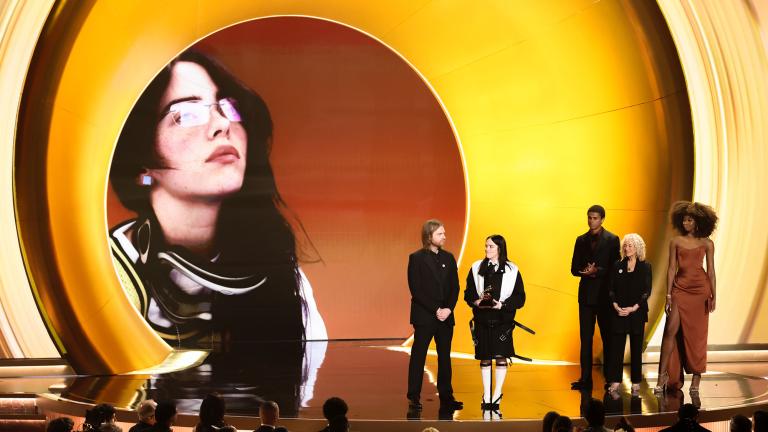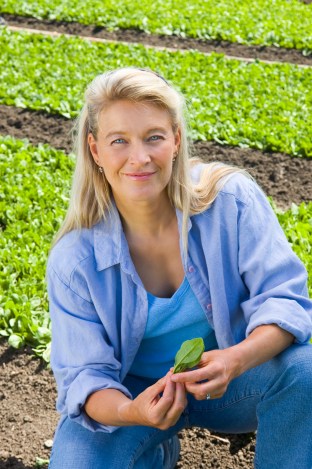 You’ve probably seen Nell Newman, even if you don’t know very much about her.
You’ve probably seen Nell Newman, even if you don’t know very much about her.
Ever since she and a business partner founded Newman’s Own Organics as a division of Newman’s Own in 1993, the image of Newman and her father, Paul, dressed up in their best country gothic guises has appeared on the labels of everything from pretzels (their first product) to their signature Fig Newmans. After becoming an independent company in 2001, Newman’s Own Organics went far beyond the basics, bringing us surprises like organic pet food and fair trade coffee at McDonald’s.
Behind that famous image is a remarkably down-to-earth sustainable food advocate from Santa Cruz, Calif., known for her friendship with Alice Waters, and a regular gig as a judge for the Good Food Awards.
Grist had the chance to chat with Newman recently about her environmentalist roots, her father’s tendency towards wild PR stunts, and her thoughts about the upcoming election.
Q. You are a strong environmentalist, with experience working for the Environmental Defense Fund, and several wildlife and wilderness projects. Why did you decide to start an organic food company?
A. I’ve always been an environmentalist. I grew up in Westport, Conn., when it was very rural. My parents would go back and forth between Connecticut and Beverly Hills — they would make a movie one year and then go back to Connecticut. And my time was spent running around the woods with a pack of dogs, fishing. I was fascinated by nature, particularly birds, and I was really crushed at the age of 10 or 11 to discover that my favorite bird, the peregrine falcon, fastest animal on the planet, had gone extinct east of the Mississippi. They had no idea why, and it was spreading across the United States, this mass disappearance of peregrine falcons. I knew what extinction was — I knew that we had eaten all the dodo birds and shot all the passenger pigeons and I was really horrified. Within the next couple of years they began to figure out it was this thing called DDT, which my mother had to explain to me was something that we sprayed on our food to kill insects. So I guess that was really the catalyst.
Q. Producing anything on a large scale almost always includes some negative environmental impact, whether in production, shipping, packaging, etc. What kinds of measures does your company take to mitigate that impact?
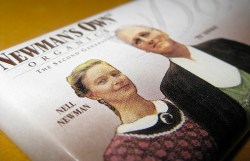
Boz Bros
A. All of our products are co-packed, meaning we have other companies that make them for us. The only one that has gone out on a limb to really work on their packaging has been Green Mountain Coffee Roasters. But you know, the packaging thing has just been a complete nightmare; it’s so hard to figure out. For us, our big commitment is to organic agriculture and when somebody comes out with some [green] packaging that keeps our product fresh, is affordable, and isn’t made out of genetically engineered corn, then we’ll be happy to make some changes.
Q. Newman’s Own Organics brings fair trade, organic coffee to 650 McDonald’s locations in New England and New York. How did this partnership come about?
A. We’ve made coffee with Green Mountain now for 10 years. They came to us and we really liked them because of their social mission, and because they had people on the ground in all these countries. They were buying direct long before anyone else was thinking about that. We love working with Green Mountain and in 2005, McDonald’s on the East Coast was looking for a better coffee and they came to Green Mountain and within two or three months, 500 or 600 restaurants had voted that they were going to bring in our coffee. It’s amazing because we’re serving coffee to people that may have never had an organic product, or had the opportunity to have an organic product.
Q. Were you reluctant to enter into that partnership?
A. I had reservations about it until I went and met with them. They were so enthusiastic about wanting our organic fair trade coffee, all I could think was, “What excuse would I have to not want to support them?” It’s a market. They’re offering it to a whole group of customers who have never tried organic products. Who am I to be so holier-than-thou and say no?
Q. What kinds of reactions did you get when you started telling people your plans to manufacture pet food with the same high standards you were manufacturing human food?
A. People were a little shocked and laughed about it because, you know, some people are very interested in making sure that their pets eat good food, but organic seemed a little over the top. But people love their pets and it has proven to be really worthwhile. I don’t know if it has anything to do with the fact that Dad ate a can of pet food on Jay Leno as a joke. I think they put meatballs in it. It was one of those surprise things. He would be on some show and bring some product, like pretzels or cookies. It was really wonderful, a great way to get PR.
Q. What was your reaction to the Stanford meta-study that was said to have found organic food to be less nutritious than conventional food?
A. I read it and I met with several people whose names and opinions I trust. One of the first things that came out was that one of the coauthors had also authored the “cigarettes are safe” study, which was a concern. They also overlooked two very significant studies. I think it was really a matter of how they looked at their results. They didn’t make a point of highlighting the fact that you get less pesticides from eating organic. They were asking the wrong questions, is what it really boiled down to.
Q. What do you say to critics who say the organic industry has gotten too big for its own good?
A. You know, it’s a mixed blessing when you ask the government to come in and regulate you, which is what we did as an industry. The good part was for us when we were buying wheat from one state and figs from another state, you had different standards. You had some states that had no organic standard at all. So part of the rationale for devising a national organic standard was to have an equal playing field and make it so that it was easier to certify a product.
You have big companies coming in and buying smaller companies and trying to make money off it. A lot of the industry doesn’t like that. I think there have been pros and cons to how that’s worked. Some companies have not been as upstanding as others, but I think [the national USDA standard] has really grown the industry when you look at it overall. It’s definitely a mixed blessing and I see both sides of it.
Q. There is obviously a strong relationship, especially for you, between organic food and environmental justice. Do you think that there’s a relationship between organics and social justice?
A. It’s unfortunate — due to farm subsidies partially — that conventional food is cheaper. You would look at that and say how could that possibly be true? Well, [organic is] more labor intensive. So does that make it a food justice issue because it is more expensive and therefore less accessible to people who have less money? I think it does. Wholesome Wave — whose board I sit on — has really tried to make it less of an issue by doing their double value food stamp program through the USDA with local nonprofits to make food at farmers markets more available in underserved areas.
Q. What do you see as the responsibility of your company in that movement?
A. For us, we’re in a tough position. We’re paying a royalty to the Newman’s Own Foundation, which they donate to charity [to a range of nonprofit organizations, including Feeding America]. And that makes us a little more expensive than everybody else.
Q. What do you do when you’re not running Newman’s Own Organics?
A. I have a little tiny garden, I’ve got 10 chickens — which I think is probably one over the limit for Santa Cruz County — a pear tree, a Meyer lemon, a Rangpur lime, and a couple of raised beds. So I do a lot of gardening. I sit on a couple of nonprofit boards. I sit on the board of Ecotrust, which is out of Portland and is committed to sustainable development around the world. And then the other is Wholesome Wave, which was started by Michel Nischan. And I fish and I surf a little bit when it’s not too crowded.
Q. You are also very politically minded. Do you have any thoughts you’d like to share on this year’s election?
A. The election is very nerve-wracking for me as a born-and-bred, bleeding heart liberal, as my dad used to joyously call himself. I think Obama inherited a mess and although he has definitely not been as strong on the environment or GMOs as I would have liked, he is a head above Mitt on all of the important issues to me. I really wish that he had been 15 years older when he became president, so he would have had more experience. But I find Mitt Romney and his running mate more than frightening. With Mitt, his flip-flopping on everything shows a lack of substance as far as I’m concerned. And Ryan — I won’t even go there.
